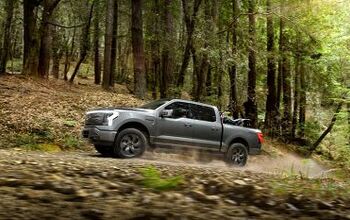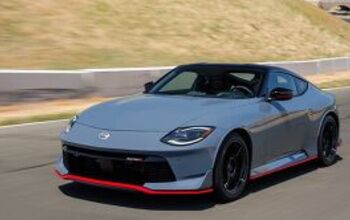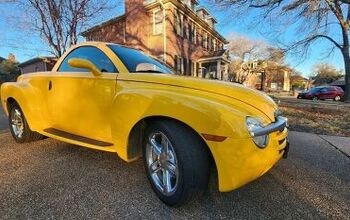Volkswagen Stops ID. Buzz Production Over Battery Issues

Volkswagen has suspended production of the all-electric ID. Buzz model in Hanover, Germany, with local media citing problems with the battery system.
Since Buzz production commenced earlier this month, VW Commercial Vehicles has manufactured about 500 examples. However, it has not yet delivered any to customers, making the situation vaguely similar to the Japanese recall affecting the Toyota bZ4X and Subaru Solterra. Though the sibling EVs from Asia were afflicted by faulty wheel hubs, Volkswagen’s van is reported to be cursed with problem battery cells. Considering the issues the company has had with battery suppliers in the past, one would think that VW would be well-positioned to deal with this problem. Unfortunately, the automaker has confirmed that these are new cells from a different supplier that is currently used exclusively on the ID. Buzz.
Early reporting on the issue was conducted by Hannoversche Allgemeine Zeitung, before being picked up by Electrive for the English-speaking world. The good news is that there don’t appear to be any fire risks or defects so serious that the vehicles have been rendered undrivable. Instead, reports have suggested that the 82 kWh battery (77 kWh usable capacity) is underperforming – noting voltage drops that might affect range and acceleration.
That’s the good news. The bad news is that the unit was eventually supposed to be slotted into other MEB-based products that have already suffered production delays. This presumably includes the ID.4 ( which suffered software gremlins and a limited battery recall) and the ID.5 (which couldn’t get enough wiring harnesses in from Ukrainian suppliers).
From Electrive:
A spokesperson for Volkswagen Commercial Vehicles confirmed to electrive.net that only the ID. Buzz is affected – although other MEB models in the ID.3, ID.4 and ID.5 series with a battery with 77 kWh of usable energy content are also on offer. “It is a new battery cell from a different supplier that is currently only used in the ID.Buzz,” the spokesperson said. “Therefore, only the production in Hanover is affected, but not other locations.” However, he said, the new cell will later be used in other MEB models. The spokesman would not disclose which manufacturer was involved when asked.
This year, [Volkswagen Commercial Vehicles] targets producing up to 15,000 units of the ID.Buzz Pro and ID.Buzz Cargo EVs. After the ramp-up, up to 130,000 vehicles per year can be produced in Hanover in the future. Sales of both models reportedly began on 20 May. The passenger car variant ID.Buzz Pro starts at a gross list price of €64,581. The ID.Buzz Cargo is available for a net list price of €45,740 and €54,430 (gross).
It may be pure coincidence that currently, yet another battery problem with an MEB model became known – it is an isolated case. Norwegian eMobility Youtuber Björn Nyland recently had to abort a range test in a VW ID.5 GTX because the battery could only retrieve around 65 kWh of energy content. Usually, 77 kWh is the usable net energy content; gross, 82 kWh are installed in the vehicles. In the case of Nyland, VW Norway justified the measurements with a defective battery module.
For a company that seems to have bet everything on electrification, Volkswagen seems to be having a lot of trouble with its battery packs. But it would be unfair to say it was the only company facing headwinds. General Motors, Hyundai Motor Group, Mercedes-Benz, Stellantis, and Volkswagen have all issued battery-related recalls since February of 2020. In some cases, those recalls involved the manufacturer recommending against parking the vehicle in garages to minimize any additional risks posed by a potential fire hazard. LG Energy Solution has frequently been a supplier of note in these events. But we’ve seen other battery purveyors being similarly being blamed for what are becoming uncomfortably familiar issues.
The silver lining for VW is that the MEB platform makes it relatively easy to swap units. That should make the issue relatively easy to deal with, assuming the supplier is the one to blame. But things will be a little tougher if these problems come down to lapses in Volkswagen’s own quality assurance.
[Images: Volkswagen]

A staunch consumer advocate tracking industry trends and regulation. Before joining TTAC, Matt spent a decade working for marketing and research firms based in NYC. Clients included several of the world’s largest automakers, global tire brands, and aftermarket part suppliers. Dissatisfied with the corporate world and resentful of having to wear suits everyday, he pivoted to writing about cars. Since then, that man has become an ardent supporter of the right-to-repair movement, been interviewed on the auto industry by national radio broadcasts, driven more rental cars than anyone ever should, participated in amateur rallying events, and received the requisite minimum training as sanctioned by the SCCA. Handy with a wrench, Matt grew up surrounded by Detroit auto workers and managed to get a pizza delivery job before he was legally eligible. He later found himself driving box trucks through Manhattan, guaranteeing future sympathy for actual truckers. He continues to conduct research pertaining to the automotive sector as an independent contractor and has since moved back to his native Michigan, closer to where the cars are born. A contrarian, Matt claims to prefer understeer — stating that front and all-wheel drive vehicles cater best to his driving style.
More by Matt Posky
Latest Car Reviews
Read moreLatest Product Reviews
Read moreRecent Comments
- Offbeat Oddity I'd go with Mazda, especially now that there's no more cylinder deactivation on the 2024 NA motor. It's around $4-5k less than the Toyota with similar equipment, and I think reliability is probably very close between them.Regarding reliability, hasn't this generation of RAV4 taken a hit? I know it's not rated as highly in Consumer Reports, and there were teething issues during the first few years. I'm surprised it's not mentioned in more reviews- even Jack Baruth's. I'm sure the bugs have been worked out by now, though.
- Peter I want a self driving red ragtop 1958 Plymouth Fury. Just like the car in the movie Christine.
- Mgh57 Doesn't seem like this tech is ready for prime time.
- Nathan The Ram is the most boring looking of the full size trucks, kind of like a Tundra.If they cancel the Ram Classic, I hope a full resign makes the Ram at least look interesting.
- DJB1 I'll be all for it when it has a proven safety record. I have an awesome life and a lot to live for, so right now I'm not putting that in the hands of overconfident tech-bros.




































Comments
Join the conversation
So will this battery issue affect Ducati E-bikes? (to raise the important question)
Possibly the most over-hyped new car intro ever, it's been threatened as an actual product for 10 + years. Supra and Bronco pale in comparison. And every update seems to contain a thread of pending disappointment for the ID.Buzz. And with VAG group's customary quality and electrical concerns, I'll pass, despite how appealing the package is.